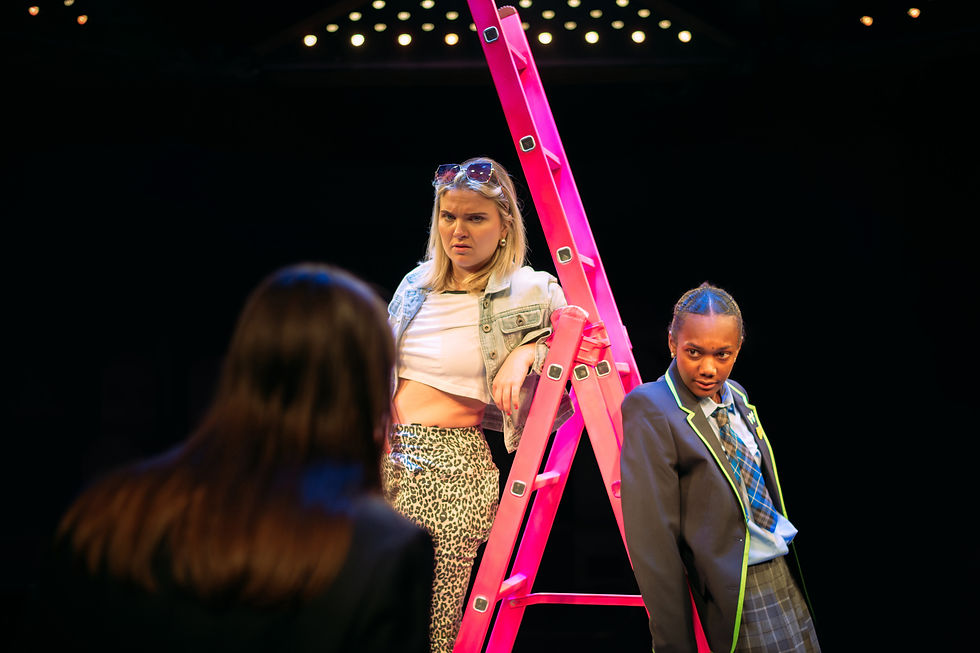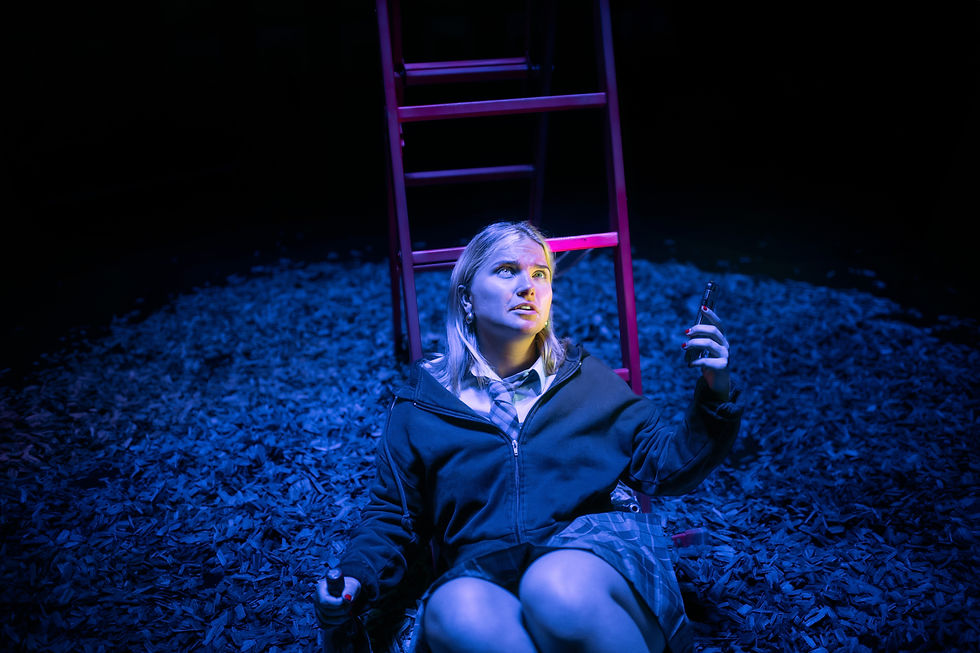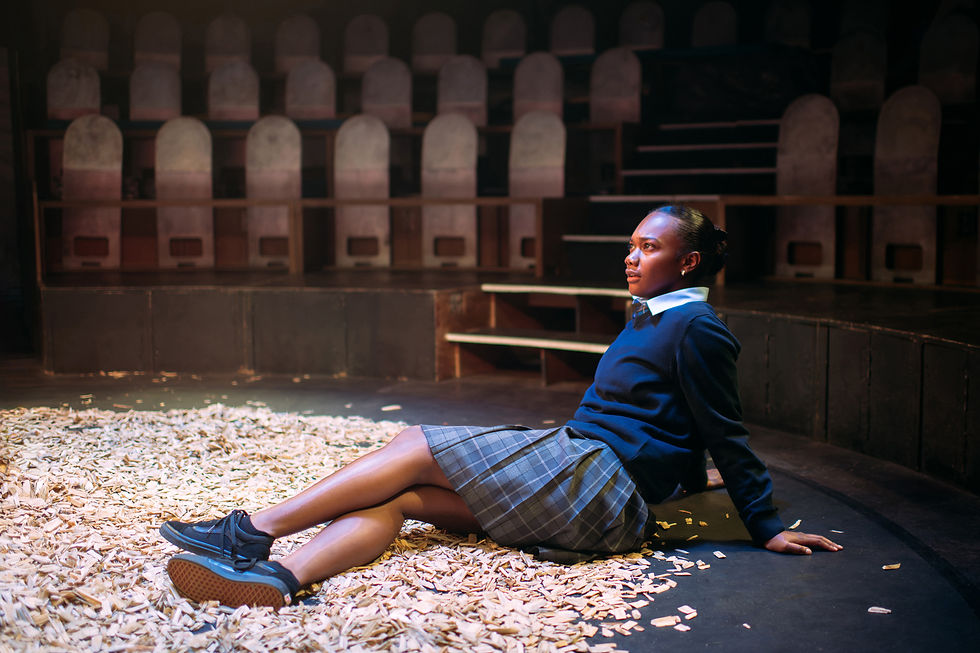Review by Seth Wilby
⭐️⭐️⭐️⭐️
What do you remember about being a teenager? What’s been the lasting impact of those friendships that you made? Taking root in Bristol Old Vic’s 180-seat studio space, Playfight follows three girls through their teen years, exploring how they grow as friends and as individuals in this coming-of-age story where GCSE results and university offers will prove to be the least of their worries.

First performed at the Edinburgh Fringe last Summer, Julia Grogan’s enthralling tale of the ascent into adulthood sets the story against the tree by which the three girls regularly meet, acting as a graceful metaphor for the memories kept as you grow up, beautifully depicted by a bright pink ladder taking centre stage (design elements are credited to Hazel Low) which offers hope and youthfulness amongst the turbulence. Grogan’s script manages to be both devastatingly human and riotously funny, with the exchanges between these girls stuffed with quick-witted remarks that expose their relationships with such truth and relatability that the laughs never cease (describing university students as having ‘short fringes, trust funds and charity shop fleeces’ was a particular crowd-pleaser). The audience were captivated and charmed, eating out of Grogan’s hands and rooting for these characters with every syllable.
Where Grogan’s writing succeeds most, though, is in its ability to deal with difficult themes of suicide and sexual violence in a way that feels both sensitive and honest. Never are these themes overly drilled in, but they similarly never feel glossed over, instead remaining as a looming presence to these friends, as they are in life itself. The story is refreshingly simple, and overwhelmingly authentic, with a strong beating heart at the centre of this play that is stunning in its truth. The conversations bounce between love and hate in the way that true friendships do and, although those difficult conversations are never avoided, the majority of the play is aware that life is fuelled by the little moments between friends, which often manage to provide even clearer insight into their true feelings.

Such a simple premise depends on its cast to lend engaging portrayals to the enrapturing words, and this cast do not disappoint. Their friendship feels like it has been crafted in pure truth with an openness and acceptance in this relationship that’s quite refreshing to watch. Storylines are evenly distributed amongst the three, but their performances truly excel in their concern and love for one another. These are three extremely nuanced performances, managing to execute the emotional strain the writing requires but never directly addresses, and demonstrating such subtle work in their maturity and demeanour to highlight their growing up as time passes. At no point is there such extreme tension that we feel stuck in fiction and, similarly, we never feel lost in exuberance. These are characters portrayed with genuine flaws, but we’re reminded that that’s okay.
Nina Cassells portrays Zainab, whose struggles with coming out prove far deeper than they first appear. Cassells’ performance is inherently likeable, layered with a youthful aspiration and genuine worry for the paths that she sees her two friends taking. As Keira, Sophie Cox is a comic standout, unashamedly speeding through various stories of fake IDs and impulsiveness. Cox’s Keira is bold and confident, with her initial savviness lasting amongst the added complexities of fear and self-doubt. One moment, where Keira is relieved of a weighty emotional burden, showcases the subtle depth created in Cox’s versatile performance. The trio is completed by Lucy Mangan, as Lucy, who is both certain in her religious convictions and conflicted by them. Mangan begins with a naivety and innocence, happily enjoying her own world that we know will not last forever. Lucy’s character growth is the clearest, with Mangan having slightly changed in nature each encounter. As Lucy grows more assertive, she also appears more lost, tragically foreshadowing the inevitable.

Emma Callander’s direction constructs a well-paced show, running at just under seventy minutes without any need to be longer or shorter. Scene transitions are clear yet swift, and the audience are constantly captivated, with earlier moments called back to at times, but mainly having their impact seen through inference. The show possesses an almost enchanting nature, holding some haunting qualities from Roly Botha’s compositions, but is mainly staged rightfully in realism. The only exception to this is in a dreamlike sequence during the penultimate scene, which is not only confusing and unnecessary, but also removes the truth that the preceding hour was based on. Although its purpose is made clearer in the final scene, this is still a moment that requires substantial restaging since it currently restricts the impact the story could have, a clear outlier in what is otherwise a fantastic play.
Playfight is a stunning exploration of teenagedom and growing up, connecting to the audience in its pure truthfulness and humanity. This production excels in all areas, from its humour to its sensitivity to its layered performances, showcasing the brilliance of small-space theatre in a play I hope continues to grow.
Playfight plays at the Bristol Old Vic Studio until March 29th
For tickets and information visit https://bristololdvic.org.uk/whats-on/playfight
Photos by Mihaela Bodlovic

